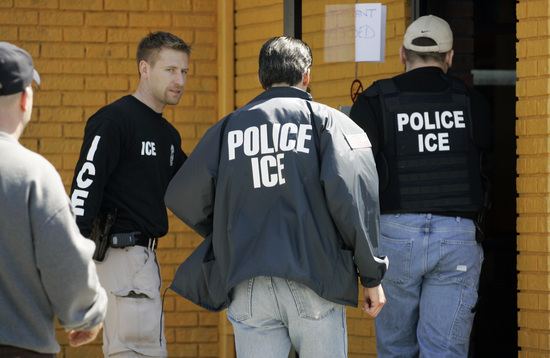In early December, I warned that Donald Trump’s mass-deportation plans could backfire on Republicans. The core problem? Manpower. It takes a lot of resources to round up undocumented immigrants—and that’s feasible only in red states, where Republican governors are likely to lend their own law enforcement forces to help U.S. Immigration and Customs Enforcement. In sanctuary cities, federal agents are mostly on their own.
This dynamic has serious implications for the 2030 census and reapportionment. Undocumented immigrants are counted in the census. If deportations and fear-driven migration to safer states reduce the population in Republican strongholds like Florida and Texas, those states might gain fewer House seats than expected. Meanwhile, blue states like California, Illinois, and New York—previously on track to lose representation—could see those losses softened.
That was the theory at the time. Now we’re seeing some proof it may be playing out.

A new piece in The Times of London offers a telling anecdote: A Miami construction manager witnessed a raid where 15 to 20 federal agents and police officers stormed his job site … and arrested just two undocumented workers. “It was just an obscenely outrageous show of force, over the top, it just seemed like too much,” the manager said.
And that’s with local police support. It’s exactly why Trump’s crackdown struggles in sanctuary cities—no local cooperation, plus mutual aid networks that sound the alarm when ICE is nearby.
In Miami, the consequences are stacking up fast.
First, it’s choking Florida’s booming construction industry. “In January the Associated Builders and Contractors—a trade organization—said the construction industry would need to attract 439,000 workers this year to meet demand,” reported the Times.
Without them? Soaring labor, housing, and construction costs.
But instead of recruiting more workers, Florida is bleeding them. And another Trump action is making things even worse. “The legal workforce is expected to shrink further after the administration succeeded in removing temporary protection status (TPS), a type of immigration status, from 472,000 Venezuelans,” the Times notes. “Hundreds of thousands of people from other nationalities are also likely to lose their TPS.”
Republicans often claim that slashing the immigrant population will lower housing prices. The worst offenders include right-wing Cuban retirees, like Havana-born Jose Martinez, who came during the Mariel boatlift. “Sorry but it’s true, we don’t know who these people are,” he told the Times. “We came here the right way, we came legally. These people are different. Some of them are criminals.”
Apparently, “the right way” meant getting Cold War favoritism that Cubans enjoyed at the expense of every other Latino group. And as any honest observer will tell you, that policy was horseshit. The Mariel boatlift? It included tens of thousands of criminals because Fidel Castro emptied his prisons into Florida.
Here’s the problem for Republicans: Florida’s economy can’t sustain its torrid growth without new housing—and developing new housing requires labor. Instead, labor shortages—and Trump’s tariffs—will jack up costs, deterring people from moving there. In addition, the deportations themselves will further mitigate the state’s population growth, impacting the census count and the state’s projected pickup of four electoral votes and House seats.
And just as I predicted, immigrants are fleeing Florida. That same construction manager? After the raid, another of his crew members—one with legal work status—left for Georgia, where immigration enforcement is lighter.
Los Angeles, despite Trump’s best efforts to crack down, may now become a magnet for immigrants. With tens of thousands of homes needing rebuilding, and no local labor force to do it fast, immigrant workers will go where they can earn and live in peace.
Trump has unleashed policies that are scrambling economic and demographic trends. The fallout could be huge—and it’s unlikely to benefit the people who cheered him on.
